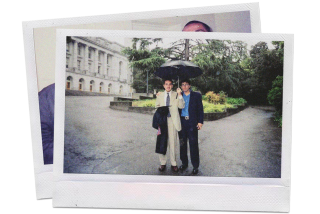Book Review : Literary Best of Waverley in the Paris Extracts of Root
- Share via
The Paris Edition. The Autobiography of Waverley Root 1927-1934, edited and with an introduction by Samuel Abt (North Point Press: $16.95; 208 pages)
The purpose of food is action, if you think of action in a broad sense that includes survival and the conversational brilliance generated by gastronomic sublimity. God and Darwin didn’t design us as cesspools but as septic systems with their leaching, fertilizing and generally transformational characteristics.
It seems to me that the best writing about food, after evoking its subject, does something besides celebrate, deplore and tell why. It is post-prandial conversation. It wanders off into history, eating habits, regretted companions, the idiosyncrasies of particular cooks, truffle-pigs, and what the great chef Vatel had for breakfast the day he killed himself because the groceries hadn’t arrived for the king’s dinner.
To readers who believe that beside-the-point is also the point when it comes to food, the name Waverley Root is a pleasing memory. At least, to readers who lived in Europe at some point over the past few decades.
A serenely pugnacious man, and a large one--a letter just before his death in 1982 reported the doleful conclusion that oysters are fattening--Root wrote about food for the International Herald Tribune in Paris. He wrote about it as Robert Louis Stevenson wrote about the donkey in “Travels With a Donkey.” Food took him places, at least mentally.
Samuel Abt, another serenely pugnacious man, though relatively small, has now come along to provide an extract of Root. Abt, who got to Europe by covering the Tour de France bicycle marathons, remained to become an editor at the Tribune and a latter-day colleague of Root’s. He never met him in the flesh but edited his last contribution and exchanged a long correspondence with the object of teasing out what has become the present memoir. Never mind that it is subtitled “The Autobiography of Waverley Root, 1927-1934.” Anyone expecting a 7-year-old’s memoir will be in for a surprise.
The memorialist lived to be 79. As for the food, it is barely visible. Root’s subjects were journalism, sex, youth, eccentricity and the final years of two institutions: the lively and erratic Paris edition of the Chicago Tribune--brief home to James Thurber and Ezra Pound, among others--and the American romance with the Parisian expatriate life.
Essentially, the book is anecdote--some splendid, some mild, some familiar and some not--told in Root’s clean, cool and wonderfully evocative style. It has subjects and portraits, but if it has a theme, it is the welcome unregeneracy of: Yes, by God, things were a hell of a lot more fun in those days!
Abt, apt disciple and clear spirit, takes up the theme in his introduction. Writing ruefully from his Herald Tribune desk, he gives us the present tense of fun past, citing the newspaper’s market surveys and promotional schemes and the announced intention of a recent editor to spend any new profits not on the editorial side but on circulation.
Insulted by Reviews
Root’s recollection of Left Bank literary life, entitled “I Never Knew Hemingway,” is fairly bland. Root never knew Gertrude Stein either, though he believes she may have felt insulted by his reviews of her books; in any case, she stopped sending him free copies.
His account of Lindbergh’s landing and the journalistic confusion that attended an essentially unexpected event is amusing, though much of it has been told before. On the other hand, his portrait of life at the Chicago Tribune’s Paris edition is purely wonderful.
It was the smallest of the three American newspapers in Paris. The other two were James Gordon Bennett’s Herald, which later bought the Tribune, and the Paris Times. (The common descendant of the Herald and the Tribune is the current International Herald Tribune.) The smallest, Root’s and others’ memories tell us, meant liveliest.
“Our masters in Chicago,” the author writes, “did not pay us enough to be able to dictate to us what sort of paper we should produce. You might say we took part of our pay in the power to put out our kind of paper.”
“Our” refers to the talent and eccentricity that wrote and edited the Tribune with occasional sharp jerks on their leash from the parent paper in Chicago. The principal jerker, of course, was the greatest eccentric of all, Col. Robert McCormick, whose hunches were canonical. One resulted in the Rome correspondent being rushed to Madrid in 1929 to anticipate the Spanish Civil War, which did not break out for another seven years.
There are plenty of what may seem to be stock journalistic anecdotes. There were the adventures of the newspaper’s groupie. There was the embezzling cashier whom the staff wined and dined after he got out of jail, hoping to hear of glamour and high-living with the proceeds. He turned out to be the same thin-lipped spirit who formerly charged them interest on their pay advances.
There is a clutch of drunken newspapermen, but Root’s style elevates his subject. Here is his account of the limping Spencer Bull:
“He acquired the limp by wrenching open an elevator door, theoretically immovable since the elevator was not at the same floor, a feat he could never have performed sober. He reached the bottom of the shaft without benefit of elevator and got off lightly with only the limp. Drunken men, it appears, fall gently, like flowers.”
And so do Root’s stories.
More to Read
Sign up for our Book Club newsletter
Get the latest news, events and more from the Los Angeles Times Book Club, and help us get L.A. reading and talking.
You may occasionally receive promotional content from the Los Angeles Times.










